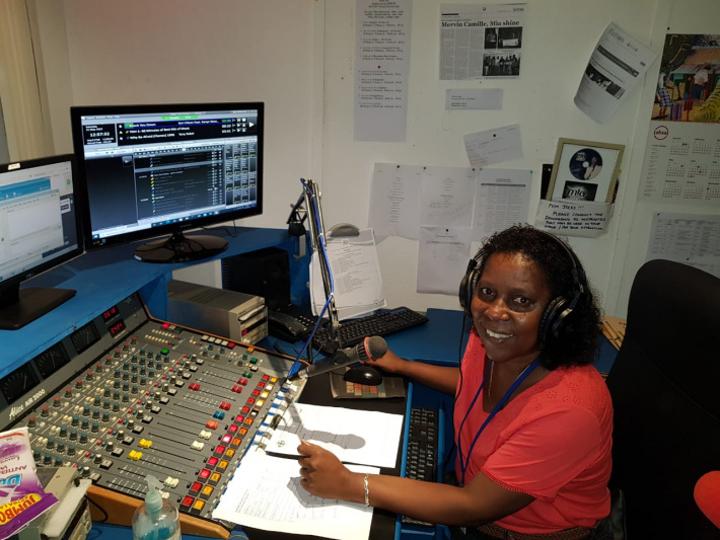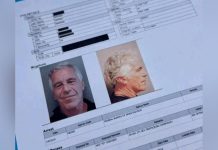Africa-Press – Seychelles. ‘I did not choose radio, I think the radio chose me’
Betymie Bonnelame has been entertaining radio listeners in Seychelles on the popular Paradise FM Radio and also ‘Radyo Sesel’ for about 23 years after several breaks since making her debut in 1989.
The press met up with her at the Paradise FM’s studio and she shared her personal experiences as a ‘radio DJ presenter’.
How did it all start for you at Paradise FM?
Betymie Bonnelame: After completing media studies in 1988, I started working at the Seychelles Broadcasting Corporation (SBC). I started at the radio. I did sports news for the only radio station then because FM was not up and running yet. At that time the TV station was at Hermitage and the radio station at Union Vale. I was also a TV journalist. After FM was set up I started to do the reggae show ‘Reggae Vibes’, now called ‘Reggae and Sports’.
At some point, I stopped working at the radio for two years. Then I resumed in 2006. So, I have about 23 years of experience working at the radio. I started as a full-time employee, but now I am doing only part-time. After I completed the media studies I was working full-time on both TV and radio. Then I switched to education instead. That was when I went to the National Institute of Education (NIE) to follow a teaching programme from 2004 to 2005.
Why radio?
Betymie Bonnelame: Frankly, I did not choose radio. I think the radio chose me. I started on TV and then went on to do radio. I remember I always liked the way people enjoyed listening to Jacqueline André presenting sports. I really liked her programme as well and I liked sports. Moreover, there is the music element with radio; and I love music. That is why I like radio better. In fact, I like best the music shows than the talk shows. When FM came around it was like more music than talk whereas on AM it is the opposite. That is why I decided to stay at FM.
Share your experience working on the radio and the opportunities and challenges you have encountered.
Betymie Bonnelame: I have had the chance to interact with a lot of people and you have the opportunity to also work with different people. The radio has been a way for me to connect with people. Unlike TV where you record your programme and then it is aired; with radio it is different. Different in the way that you are able to build a better and closer rapport with the audience.
In terms of challenges, at times it can be very hectic especially when working at night, and you have children to look after. So, I had to try and balance family life with working on the radio. It was more difficult when I was working on TV as I had to work at nights and weekends; in fact at any time. However, at the radio I was able to balance things a bit and adjust my work schedule with that of my responsibilities at home. I toned it down a bit after I gave birth to my little girl. I was working at night and I had to stop. At that time I was working until 9pm.
Apart from that I have not been through many problems since I have been on the radio. All in all it has been mostly positive.
You have done ‘Love SOS’, ‘Reggae Vibes’. What other shows have you hosted?
Betymie Bonnelame: I used to do ‘The Cruise’, formerly known as ‘Ozone’. ‘The Cruise’ is the programme that is now hosted by Oriji. This show is basically a mix of everything. For instance, we did current news of the day, sports and music of course. This lasted until 7pm before the next presenter came in for the late night shows. Yeah, I have done only these three shows.
I also do ‘Reggae and Sports’ and ‘Sunday Breakfast Show’. The initial idea of starting the ‘Reggae Vibes’ was purely to bring Reggae to the fore and let people know more about the history of Reggae itself.
How is Radyo Sesel different from Paradise FM?
Betymie Bonnelame: The difference with SBC Radyo Sesel and Paradise FM is that on SBC radio we are known as presenters whereas on Paradise FM we are both presenters and DJs. Moreover, on Radyo Sesel you work with a technician who does the mixing and other stuff for you, whereas on Paradise FM we do everything ourselves. We do the mixing, we run the mics, we do all. FM is basically a one-man show.
To tell you the truth, I enjoy FM the most. I say this because, when I worked at Radyo Sesel, it was the technician who told me when to play the song and he is the one monitoring the time. As a presenter I only presented. On the other hand, on Paradise FM I can manage my time and also manage the mixer, the microphone and even my phone. It is a bit difficult and demanding, however. That is why not a lot of people want to do this job. It involves a lot of multi-tasking and simultaneous actions, so it is not easy to learn. A lot of training is required and of course the person should have certain interests in this line of work.
What are the qualities a radio presenter and DJ must have?
Betymie Bonnelame: One, you need to be very organised and have a good approach towards your work. You need to be able to see the positive side of things. I say this because the way you are as a person comes across to your audience when you interact with them. Some listeners may know when a DJ presenter is in a good or bad mood based on the tone of their voice and the selection of music they play. Listeners are very perceptive and they pick on these things very easily.
Additionally, you should be willing to talk to people and listen to what they have to say. Some people actually call just to tell you something which may not be relevant, they basically just want to talk to someone. So, you have to be prepared for that and give them some time to share whatever they have to share. As important you should be able to bring about the hype in order to capture your listeners’ attention. You also need to be spontaneous. For example, during ‘Love SOS’, this used to happen a lot. Lots of people called and texted, so you needed to be able to listen attentively and ……..think on your feet, so to speak.
Moreover, people at times underestimate the extent of research we have to do in order to ensure that the show is a success. Since I have been on the radio for a long time, I have now mastered many things. For example, when it comes to Reggae music, people will often ask me how I know all these things. So, I tell them that I grew up listening to Reggae music, since I was about 7 or 8 years old. You see, I had uncles who were Rastafarians and they listened to Bob Marley, Burning Spear, Peter Tosh, etc.… I did not grow up listening to artists like David Philoe, Joseph Louise and such. So, all in all, these are the things I grew up knowing; so, I have the background and knowledge. People tell me that I am like a Reggae dictionary. However, reggae evolves, so there is still a lot of research to be done to prepare for my shows.
What kind of reviews have you received from your audience?
Betymie Bonnelame: I would confidently say that I have good interactions with my listeners. For ‘Reggae and Sports’ and the ‘Sunday Breakfast Show’, which are two different shows with two different audiences, it has been good. What has brought this about I think is because I am versatile as a DJ. Generally, I am someone who likes to talk, people know that I think. I like to bring positive things to the fore. However, when we were asking if people were satisfied with the radio and what they think should be done differently, some people said that FM should be like AM, with more programmes. So, I asked them, what kinds of programmes you would like to see? They stated illustrative programmes where we have to explain a lot of things. People think that because SBC has two radio stations, they want more information on FM like on AM. They should understand that these are two different stations with two different purposes.
I do sports as well, and the issues come when people support different teams. So such opinions must be managed well so that things do not escalate negatively. Fortunately, I have never been in such a situation, but I do know other people have experienced it because they have not been able to manage a conversation in view of difference in opinion.
Radio is obviously different from TV in terms of how audiences engage with the content. How do you engage your audience on the radio?
Betymie Bonnelame: For me this is easy, because I am someone who enjoys reading and narrating. When reading and retelling what happened in a book for instance, it is how you make the person understand what happened in the book with words only. It is like I am giving the person a summary of the book. This part of the work has never been a challenge because it is something I have always enjoyed doing.
What are the moments that you have enjoyed the most in your work?
Betymie Bonnelame: I think it would be when I have kids on the programme. When you get their perspectives, it is fun. For instance, when they tell you that they enjoy listening to the radio. It shows that radio has a future. The best moment for me was when Lana Constance came on the show. She actually chose ‘Reggae and Sports’ show among all the other shows. People really enjoyed the show that day. When talking about Reggae, the topic of drugs obviously came up. Lana explained brilliantly that day that drug abuse and alcohol drinking is a personal choice. Personally for me sports do not go with alcohol.
Lana was 14 years old at that time. Her perspective on life itself brought positivity to the audience. The message was received and she even went further and explained her position as a youth. That for me was the best show last year.
What message do you have for your audience out there?
Betymie Bonnelame: During my shows I talk about what I call ‘social conscious’. I want to make people think about things that are happening in society, to get them to make decisions and to be part of the show. There is a need to bring positivity to people and make them understand that they need to fight for the important things in life. I like to make people think and reflect on where they have been, where they are now, how they got here and where they could be. I want them to persevere and work hard in life and to bring positivity. This is what I am here for. I think this is the message I want to put forward. People should believe that things will get better, and like Israel Vibration would say, “try again”, because you never know when it is going to be your lucky day.
For More News And Analysis About Seychelles Follow Africa-Press






